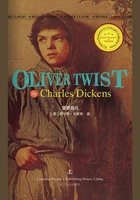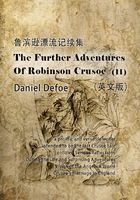At about this time a stranger appeared in Cloisterham; a white-haired personage, with black eyebrows. Being buttoned up in a tightish blue surtout, with a buff waistcoat and gray trousers, he had something of a military air, but he announced himself at the Crozier (the orthodox hotel, where he put up with a portmanteau) as an idle dog who lived upon his means; and he farther announced that he had a mind to take a lodging in the picturesque old city for a month or two, with a view of settling down there altogether. Both announcements were made in the coffee-room of the Crozier, to all whom it might or might not concern, by the stranger as he stood with his back to the empty fireplace, waiting for his fried sole, veal cutlet, and pint of sherry. And the waiter (business being chronically slack at the Crozier) represented all whom it might or might not concern, and absorbed the whole of the information.
This gentleman's white head was unusually large, and his shock of white hair was unusually thick and ample. 'I suppose, waiter,' he said, shaking his shock of hair, as a Newfoundland dog might shake his before sitting down to dinner, 'that a fair lodging for a single buffer might be found in these parts, eh?'
The waiter had no doubt of it.
'Something old,' said the gentleman. 'Take my hat down for a moment from that peg, will you? No, I don't want it; look into it. What do you see written there?'
The waiter read: 'Datchery.'
'Now you know my name,' said the gentleman; 'Dick Datchery. Hang it up again. I was saying something old is what I should prefer, something odd and out of the way; something venerable, architectural, and inconvenient.'
'We have a good choice of inconvenient lodgings in the town, sir, I think,' replied the waiter, with modest confidence in its resources that way; 'indeed, I have no doubt that we could suit you that far, however particular you might be. But a architectural lodging!' That seemed to trouble the waiter's head, and he shook it.
'Anything Cathedraly, now,' Mr. Datchery suggested.
'Mr. Tope,' said the waiter, brightening, as he rubbed his chin with his hand, 'would be the likeliest party to inform in that line.'
'Who is Mr. Tope?' inquired Dick Datchery.
The waiter explained that he was the Verger, and that Mrs. Tope had indeed once upon a time let lodgings herself or offered to let them; but that as nobody had ever taken them, Mrs. Tope's window-bill, long a Cloisterham Institution, had disappeared; probably had tumbled down one day, and never been put up again.
'I'll call on Mrs. Tope,' said Mr. Datchery, 'after dinner.'
So when he had done his dinner, he was duly directed to the spot, and sallied out for it. But the Crozier being an hotel of a most retiring disposition, and the waiter's directions being fatally precise, he soon became bewildered, and went boggling about and about the Cathedral Tower, whenever he could catch a glimpse of it, with a general impression on his mind that Mrs. Tope's was somewhere very near it, and that, like the children in the game of hot boiled beans and very good butter, he was warm in his search when he saw the Tower, and cold when he didn't see it.
He was getting very cold indeed when he came upon a fragment of burial-ground in which an unhappy sheep was grazing. Unhappy, because a hideous small boy was stoning it through the railings, and had already lamed it in one leg, and was much excited by the benevolent sportsmanlike purpose of breaking its other three legs, and bringing it down.
It 'im agin!' cried the boy, as the poor creature leaped; 'and made a dint in his wool.'
'Let him be!' said Mr. Datchery. 'Don't you see you have lamed him?'
'Yer lie,' returned the sportsman. E went and lamed isself. I see 'im do it, and I giv' 'im a shy as a Widdy-warning to 'im not to go a-bruisin' 'is master's mutton any more.'
'Come here.'
'I won't; I'll come when yer can ketch me.'
'Stay there then, and show me which is Mr. Tope's.'
'Ow can I stay here and show you which is Topeseses, when Topeseses is t'other side the Kinfreederal, and over the crossings, and round ever so many comers? Stoo-pid! Ya-a-ah!'
'Show me where it is, and I'll give you something.'
'Come on, then.'
This brisk dialogue concluded, the boy led the way, and by-and-by stopped at some distance from an arched passage, pointing.
'Lookie yonder. You see that there winder and door?'
'That's Tope's?'
'Yer lie; it ain't. That's Jarsper's.'
'Indeed?' said Mr. Datchery, with a second look of some interest.
'Yes, and I ain't a-goin' no nearer 'im, I tell yer.'
'Why not?'
Cos I ain't a-goin' to be lifted off my legs and 'ave my braces bust and be choked; not if I knows it, and not by 'Im. Wait till I set a jolly good flint a-flyin' at the back o' 'is jolly old 'ed some day! Now look t'other side the harch; not the side where Jarsper's door is; t'other side.'
'I see.'
'A little way in, o' that side, there's a low door, down two steps. That's Topeseses with 'is name on a hoval plate.'
'Good. See here,' said Mr. Datchery, producing a shilling. 'You owe me half of this.'
'Yer lie I don't owe yer nothing; I never seen yer.'
'I tell you you owe me half of this, because I have no sixpence in my pocket. So the next time you meet me you shall do something else for me, to pay me.'
'All right, give us 'old.'
'What is your name, and where do you live?'
'Deputy. Travellers' Twopenny, 'cross the green.'
The boy instantly darted off with the shilling, lest Mr. Datchery should repent, but stopped at a safe distance, on the happy chance of his being uneasy in his mind about it, to goad him with a demon dance expressive of its irrevocability.
Mr. Datchery, taking off his hat to give that shock of white hair of his another shake, seemed quite resigned, and betook himself whither he had been directed.
Mr. Tope's official dwelling, communicating by an upper stair with Mr. Jasper's (hence Mrs. Tope's attendance on that gentleman), was of very modest proportions, and partook of the character of a cool dungeon. Its ancient walls were massive, and its rooms rather seemed to have been dug out of them, than to have been designed beforehand with any reference to them. The main door opened at once on a chamber of no describable shape, with a groined roof, which in its turn opened on another chamber of no describable shape, with another groined roof: their windows small, and in the thickness of the walls. These two chambers, close as to their atmosphere, and swarthy as to their illumination by natural light, were the apartments which Mrs. Tope had so long offered to an unappreciative city. Mr. Datchery, however, was more appreciative. He found that if he sat with the main door open he would enjoy the passing society of all comers to and fro by the gateway, and would have light enough. He found that if Mr. and Mrs. Tope, living overhead, used for their own egress and ingress a little side stair that came plump into the Precincts by a door opening outward, to the surprise and inconvenience of a limited public of pedestrians in a narrow way, he would be alone, as in a separate residence. He found the rent moderate, and everything as quaintly inconvenient as he could desire. He agreed, therefore, to take the lodging then and there, and money down, possession to be had next evening, on condition that reference was permitted him to Mr. Jasper as occupying the gatehouse, of which on the other side of the gateway, the Verger's hole-in-the-wall was an appanage or subsidiary part.
The poor dear gentleman was very solitary and very sad, Mrs. Tope said, but she had no doubt he would 'speak for her.' Perhaps Mr. Datchery had heard something of what had occurred there last winter?
Mr. Datchery had as confused a knowledge of the event in question, on trying to recall it, as he well could have. He begged Mrs. Tope's pardon when she found it incumbent on her to correct him in every detail of his summary of the facts, but pleaded that he was merely a single buffer getting through life upon his means as idly as he could, and that so many people were so constantly making away with so many other people, as to render it difficult for a buffer of an easy temper to preserve the circumstances of the several cases unmixed in his mind.
Mr. Jasper proving willing to speak for Mrs. Tope, Mr. Datchery, who had sent up his card, was invited to ascend the postern staircase. The Mayor was there, Mr. Tope said; but he was not to be regarded in the light of company, as he and Mr. Jasper were great friends.
'I beg pardon,' said Mr. Datchery, making a leg with his hat under his arm, as he addressed himself equally to both gentlemen; 'a selfish precaution on my part, and not personally interesting to anybody but myself. But as a buffer living on his means, and having an idea of doing it in this lovely place in peace and quiet, for remaining span of life, I beg to ask if the Tope family are quite respectable?'
Mr. Jasper could answer for that without the slightest hesitation.
'That is enough, sir,' said Mr. Datchery.
'My friend the Mayor,' added Mr. Jasper, presenting Mr. Datchery with a courtly motion of his hand towards that potentate; 'whose recommendation is actually much more important to a stranger than that of an obscure person like myself, will testify in their behalf, I am sure.'
'The Worshipful the Mayor,' said Mr. Datchery, with a low bow, 'places me under an infinite obligation.'
'Very good people, sir, Mr. and Mrs. Tope,' said Mr. Sapsea, with condescension. 'Very good opinions. Very well behaved. Very respectful. Much approved by the Dean and Chapter.'
'The Worshipful the Mayor gives them a character,' said Mr. Datchery, 'of which they may indeed be proud. I would ask His Honour (if I might be permitted) whether there are not many objects of great interest in the city which is under his beneficent sway?'
'We are, sir,' returned Mr. Sapsea, 'an ancient city, and an ecclesiastical city. We are a constitutional city, as it becomes such a city to be, and we uphold and maintain our glorious privileges.'
'His Honour,' said Mr. Datchery, bowing, 'inspires me with a desire to know more of the city, and confirms me in my inclination to end my days in the city.'
'Retired from the Army, sir?' suggested Mr. Sapsea.
'His Honour the Mayor does me too much credit,' returned Mr. Datchery.
'Navy, sir?' suggested Mr. Sapsea.
'Again,' repeated Mr. Datchery, 'His Honour the Mayor does me too much credit.'
'Diplomacy is a fine profession,' said Mr. Sapsea, as a general remark.
'There, I confess, His Honour the Mayor is too many for me,' said Mr. Datchery, with an ingenious smile and bow; 'even a diplomatic bird must fall to such a gun.'
Now this was very soothing. Here was a gentleman of a great, not to say a grand, address, accustomed to rank and dignity, really setting a fine example how to behave to a Mayor. There was something in that third-person style of being spoken to, that Mr. Sapsea found particularly recognisant of his merits and position.
'But I crave pardon,' said Mr. Datchery. 'His Honour the Mayor will bear with me, if for a moment I have been deluded into occupying his time, and have forgotten the humble claims upon my own, of my hotel, the Crozier.'
'Not at all, sir,' said Mr. Sapsea. 'I am returning home, and if you would like to take the exterior of our Cathedral in your way, I shall be glad to point it out.'
'His Honour the Mayor,' said Mr. Datchery, 'is more than kind and gracious.'
As Mr. Datchery, when he had made his acknowledgments to Mr. Jasper, could not be induced to go out of the room before the Worshipful, the Worshipful led the way down-stairs; Mr. Datchery following with his hat under his arm, and his shock of white hair streaming in the evening breeze.
'Might I ask His Honour,' said Mr. Datchery, 'whether that gentleman we have just left is the gentleman of whom I have heard in the neighbourhood as being much afflicted by the loss of a nephew, and concentrating his life on avenging the loss?'
'That is the gentleman. John Jasper, sir.'
'Would His Honour allow me to inquire whether there are strong suspicions of any one?'
'More than suspicions, sir,' returned Mr. Sapsea; 'all but certainties.'
'Only think now!' cried Mr. Datchery.
'But proof, sir, proof must be built up stone by stone,' said the Mayor. 'As I say, the end crowns the work. It is not enough that justice should be morally certain; she must be immorally certain-legally, that is.'
'His Honour,' said Mr. Datchery, 'reminds me of the nature of the law. Immoral. How true!'
'As I say, sir,' pompously went on the Mayor, 'the arm of the law is a strong arm, and a long arm. That is the may I put it. A strong arm and a long arm.'
'How forcible!-And yet, again, how true!' murmured Mr. Datchery.
'And without betraying, what I call the secrets of the prison-house,' said Mr. Sapsea; 'the secrets of the prison-house is the term I used on the bench.'
'And what other term than His Honour's would express it?' said Mr. Datchery.
'Without, I say, betraying them, I predict to you, knowing the iron will of the gentleman we have just left (I take the bold step of calling it iron, on account of its strength), that in this case the long arm will reach, and the strong arm will strike.-This is our Cathedral, sir. The best judges are pleased to admire it, and the best among our townsmen own to being a little vain of it.'
All this time Mr. Datchery had walked with his hat under his arm, and his white hair streaming. He had an odd momentary appearance upon him of having forgotten his hat, when Mr. Sapsea now touched it; and he clapped his hand up to his head as if with some vague expectation of finding another hat upon it.
'Pray be covered, sir,' entreated Mr. Sapsea; magnificently plying: 'I shall not mind it, I assure you.'
'His Honour is very good, but I do it for coolness,' said Mr. Datchery.
Then Mr. Datchery admired the Cathedral, and Mr. Sapsea pointed it out as if he himself had invented and built it: there were a few details indeed of which he did not approve, but those he glossed over, as if the workmen had made mistakes in his absence. The Cathedral disposed of, he led the way by the churchyard, and stopped to extol the beauty of the evening-by chance-in the immediate vicinity of Mrs. Sapsea's epitaph.
'And by the by,' said Mr. Sapsea, appearing to descend from an elevation to remember it all of a sudden; like Apollo shooting down from Olympus to pick up his forgotten lyre; 'that is one of our small lions. The partiality of our people has made it so, and strangers have been seen taking a copy of it now and then. I am not a judge of it myself, for it is a little work of my own. But it was troublesome to turn, sir; I may say, difficult to turn with elegance.'
Mr. Datchery became so ecstatic over Mr. Sapsea's composition, that, in spite of his intention to end his days in Cloisterham, and therefore his probably having in reserve many opportunities of copying it, he would have transcribed it into his pocket-book on the spot, but for the slouching towards them of its material producer and perpetuator, Durdles, whom Mr. Sapsea hailed, not sorry to show him a bright example of behaviour to superiors.
'Ah, Durdles! This is the mason, sir; one of our Cloisterham worthies; everybody here knows Durdles. Mr. Datchery, Durdles a gentleman who is going to settle here.'
'I wouldn't do it if I was him,' growled Durdles. 'We're a heavy lot.'
'You surely don't speak for yourself, Mr. Durdles,' returned Mr. Datchery, 'any more than for His Honour.'
'Who's His Honour?' demanded Durdles.
'His Honour the Mayor.'
'I never was brought afore him,' said Durdles, with anything but the look of a loyal subject of the mayoralty, 'and it'll be time enough for me to Honour him when I am. Until which, and when, and where,
"Mister Sapsea is his name, England is his nation, Cloisterham's his dwelling-place, Aukshneer's his occupation."'
Here, Deputy (preceded by a flying oyster-shell) appeared upon the scene, and requested to have the sum of threepence instantly 'chucked' to him by Mr. Durdles, whom he had been vainly seeking up and down, as lawful wages overdue. While that gentleman, with his bundle under his arm, slowly found and counted out the money, Mr. Sapsea informed the new settler of Durdles's habits, pursuits, abode, and reputation. 'I suppose a curious stranger might come to see you, and your works, Mr. Durdles, at any odd time?' said Mr. Datchery upon that.
'Any gentleman is welcome to come and see me any evening if he brings liquor for two with him,' returned Durdles, with a penny between his teeth and certain halfpence in his hands; 'or if he likes to make it twice two, he'll be doubly welcome.'
'I shall come. Master Deputy, what do you owe me?'
'A job.'
'Mind you pay me honestly with the job of showing me Mr. Durdles's house when I want to go there.'
Deputy, with a piercing broadside of whistle through the whole gap in his mouth, as a receipt in full for all arrears, vanished.
The Worshipful and the Worshipper then passed on together until they parted, with many ceremonies, at the Worshipful's door; even then the Worshipper carried his hat under his arm, and gave his streaming white hair to the breeze.
Said Mr. Datchery to himself that night, as he looked at his white hair in the gas-lighted looking-glass over the coffee-room chimneypiece at the Crozier, and shook it out: 'For a single buffer, of an easy temper, living idly on his means, I have had a rather busy afternoon!'















